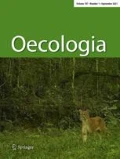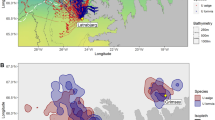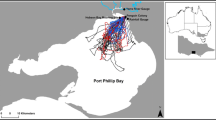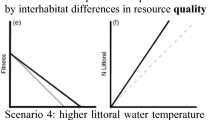Abstract
Trait variation among populations is important for shaping ecological dynamics. In marine intertidal systems, seawater temperature, low tide emersion temperature, and pH can drive variation in traits and affect species interactions. In western North America, Nucella dogwhelks are intertidal drilling predators of the habitat-forming mussel Mytilus californianus. Nucella exhibit local adaptation, but it is not known to what extent environmental factors and genetic structure contribute to variation in prey selectivity among populations. We surveyed drilled mussels at sites across Oregon and California, USA, and used multiple regression and Mantel tests to test the effects of abiotic factors and Nucella neutral genetic relatedness on the size of mussels drilled across sites. Our results show that Nucella at sites characterized by higher and less variable temperature and pH drilled larger mussels. Warmer temperatures appear to induce faster handling time, and more stable pH conditions may prolong opportunities for active foraging by reducing exposure to repeated stressful conditions. In contrast, there was no significant effect of genetic relatedness on prey size selectivity. Our results emphasize the role of climate in shaping marine predator selectivity on a foundation species. As coastal climates change, predator traits will respond to localized environmental conditions, changing ecological interactions.



Similar content being viewed by others
References
Abràmoff MD, Magalhães PJ, Ram SJ (2004) Image processing with ImageJ. Biophotonics Int 11:36–41. https://doi.org/10.1117/1.3589100
Bakun A, Black BA, Bograd SJ et al (2015) Anticipated effects of climate change on coastal upwelling ecosystems. Curr Clim Change Rep 1:85–93. https://doi.org/10.1007/s40641-015-0008-4
Bayne BL, Scullard C (1978) Rates of feeding by Thais (Nucella) Lapillus (L.). J Exp Mar Biol Ecol 32:113–129
Behrens Yamada S, Dunham JB (1989) Mytilus californianus, a new aquaculture species? Aquaculture 81:275–284. https://doi.org/10.1016/0044-8486(89)90152-X
Blanchette CA, Helmuth B, Gaines SD (2007) Spatial patterns of growth in the mussel, Mytilus californianus, across a major oceanographic and biogeographic boundary at Point Conception, California, USA. J Exp Mar Biol Ecol 340:126–148. https://doi.org/10.1016/j.jembe.2006.09.022
Bolnick DI, Amarasekare P, Araújo MS et al (2011) Why intraspecific trait variation matters in community ecology. Trends Ecol Evol 26:183–192. https://doi.org/10.1016/j.tree.2011.01.009
Burrows MT, Hughes RN (1989) Natural foraging of the dogwhelk, Nucella lapillus (Linnaeus); the weather and whether to feed. J Molluscan Stud 55:285–295. https://doi.org/10.1093/mollus/55.2.285
Burrows MT, Hughes RN (1991) Optimal foraging decisions by dogwhelks, Nucella lapillus (L.): influences of mortality risk and rate-constrained digestion. Funct Ecol 5:461–475. https://doi.org/10.2307/2389628
Cerny-Chipman EB (2016) Changing climate, changing contexts: variation in rocky intertidal predator–prey interactions seen through an environmental stress framework. PhD dissertation, Department of Zoology, Oregon State University, Corvallis
Chan F, Barth JA, Blanchette CA et al (2017) Persistent spatial structuring of coastal ocean acidification in the California Current System. Sci Rep 7:1–7. https://doi.org/10.1038/s41598-017-02777-y
Clelland ES, Saleuddin ASM (2000) Vacuolar-type ATPase in the accessory boring organ of Nucella lamellosa (Gmelin) (Mollusca: Gastropoda): role in shell penetration. Biol Bull 198:272–283
Connell JH (1961) The influence of interspecific competition and other factors on the distribution of the barnacle Chthamalus stellatus. Ecology 42:710–723
Dawson MN, Hays CG, Grosberg RK, Raimondi PT (2014) Dispersal potential and population genetic structure in the marine intertidal of the eastern North Pacific. Ecol Monogr 84:435–456. https://doi.org/10.1890/13-0871.1
de la Haye KL, Spicer JI, Widdicombe S, Briffa M (2012) Reduced pH sea water disrupts chemo-responsive behaviour in an intertidal crustacean. J Exp Mar Biol Ecol 412:134–140. https://doi.org/10.1016/j.jembe.2011.11.013
Des Roches S, Post DM, Turley NE et al (2018) The ecological importance of intraspecific variation. Nat Ecol Evol 2:57–64. https://doi.org/10.1038/s41559-017-0402-5
Endler JA (1973) Gene flow and population differentiation. Science 179:243–250
Excoffier L, Lischer HEL (2010) Arlequin suite ver 3.5: a new series of programs to perform population genetics analyses under Linux and Windows. Mol Ecol Resour 10:564–567. https://doi.org/10.1111/j.1755-0998.2010.02847.x
Felsenstein J (1985) Phylogenies and the comparative method. Am Nat 125:1–15
Fitzhenry T, Halpin P, Helmuth B (2004) Testing the effects of wave exposure, site, and behavior on intertidal mussel body temperatures: applications and limits of temperature logger design. Mar Biol 145:339–349. https://doi.org/10.1007/s00227-004-1318-6
Folmer O, Black M, Hoeh W et al (1994) DNA primers for amplification of mitochondrial cytochrome c oxidase subunit I from diverse metazoan invertebrates. Mol Mar Biol Biotechnol 3:294–299. https://doi.org/10.1371/journal.pone.0013102
Fryxell DC, Palkovacs EP (2017) Warming strengthens the ecological role of intraspecific variation in a predator. Copeia 105:523–532. https://doi.org/10.1643/CE-16-527
Geller J, Meyer C, Parker M, Hawk H (2013) Redesign of PCR primers for mitochondrial cytochrome c oxidase subunit I for marine invertebrates and application in all-taxa biotic surveys. Mol Ecol Resour 13:851–861. https://doi.org/10.1111/1755-0998.12138
Gruber N, Hauri C, Lachkar Z et al (2012) Rapid progression of ocean acidification in the California Current System. Science 337:220–223. https://doi.org/10.1126/science.1216773
Gunderson AR, Armstrong EJ, Stillman JH (2016) Multiple stressors in a changing world: the need for an improved perspective on physiological responses to the dynamic marine environment. Ann Rev Mar Sci 8:357–378. https://doi.org/10.1146/annurev-marine-122414-033953
Harley CDG, Helmuth BST (2003) Local- and regional-scale effects of wave exposure, thermal stress, and absolute versus effective shore level on patterns of intertidal zonation. Limnol Oceanogr 48:1498–1508. https://doi.org/10.4319/lo.2003.48.4.1498
Harmon LJ, Matthews B, Des Roches S et al (2009) Evolutionary diversification in stickleback affects ecosystem functioning. Nature 458:1167–1170. https://doi.org/10.1038/nature07974
Hauri C, Gruber N, Vogt M et al (2013) Spatiotemporal variability and long-term trends of ocean acidification in the California Current System. Biogeosciences 10:193–216. https://doi.org/10.5194/bg-10-193-2013
Hayford HA, Gilman SE, Carrington E (2015) Foraging behavior minimizes heat exposure in a complex thermal landscape. Mar Ecol Prog Ser 518:165–175. https://doi.org/10.3354/meps11053
Hebert PDN, Ratnasingham S, DeWaard JR (2003) Barcoding animal life: cytochrome c oxidase subunit 1 divergences among closely related species. Proc R Soc B Biol Sci 270:S96–S99. https://doi.org/10.1098/rsbl.2003.0025
Helmuth B, Broitman BR, Blanchette CA et al (2006) Mosaic patterns of thermal stress in the rocky intertidal zone: implications for climate change. Ecol Monogr 76:461–479. https://doi.org/10.1890/0012-9615(2006)076%5b0461:MPOTSI%5d2.0.CO;2
Helmuth B, Choi F, Matzelle A et al (2016) Data from: long-term, high frequency in situ measurements of intertidal mussel bed temperatures using biomimetic sensors. Sci Data 3:160087. https://doi.org/10.5061/dryad.6n8kf
Hendry AP, Day T, Taylor EB (2001) Population mixing and the adaptive divergence of quantitative traits in discrete populations: a theoretical framework for empirical traits. Evolution 55:459–466. https://doi.org/10.1111/j.0014-3820.2001.tb00780.x
Hofmann GE, Evans TG, Kelly MW et al (2014) Exploring local adaptation and the ocean acidification seascape—studies in the California Current Large Marine Ecosystem. Biogeosciences 11:1053–1064. https://doi.org/10.5194/bg-11-1053-2014
Hughes RN, de Dunkin SB (1984) Behavioural components of prey selection by dogwhelks, Nucella lapillus (L.), feeding on mussels, Mytilus edulis (L.), in the laboratory. J Exp Mar Biol Ecol 77:45–68. https://doi.org/10.1016/0022-0981(84)90050-9
Ingram T, Kraft NJB, Kratina P et al (2012) Intraguild predation drives evoutionary niche shift in threespine stickleback. Evolution 66:1819–1832. https://doi.org/10.5061/dryad.sj3v479j
Kanter RG (1977) Structure and Diversity in Mytilus californianus (Mollusca: Bivalvia) Communities. PhD dissertation, Department of Biology, University of Southern California, Los Angeles
Kawecki TJ, Ebert D (2004) Conceptual issues in local adaptation. Ecol Lett 7:1225–1241. https://doi.org/10.1111/j.1461-0248.2004.00684.x
King W, Sebens KP (2018) Non-additive effects of air and water warming on an intertidal predator–prey interaction. Mar Biol 165:1–10. https://doi.org/10.1007/s00227-018-3320-4
Kroeker KJ, Gaylord B, Hill TM et al (2014a) The role of temperature in determining species’ vulnerability to ocean acidification: a case study using Mytilus galloprovincialis. PLoS One 9:7. https://doi.org/10.1371/journal.pone.0100353
Kroeker KJ, Sanford E, Jellison BM, Gaylord B (2014b) Predicting the effects of ocean acidification on predator–prey interactions: a conceptual framework based on coastal molluscs. Biol Bull 226:211–222
Kroeker KJ, Sanford E, Rose JM et al (2016) Interacting environmental mosaics drive geographic variation in mussel performance and predation vulnerability. Ecol Lett 19:771–779. https://doi.org/10.1111/ele.12613
Kumar S, Stecher G, Tamura K (2016) MEGA7: molecular evolutionary genetics analysis version 7.0 for bigger datasets. Mol Biol Evol 33:1870–1874. https://doi.org/10.1093/molbev/msw054
Lafferty KD, Suchanek TH (2016) Revisiting Paine’s 1966 sea star removal experiment, the most-cited empirical article in the American Naturalist. Am Nat 188:365–378. https://doi.org/10.1086/688045
Largen MJ (1967) The influence of water temperature upon the life of the dogwhelk Thais lapillus (Gastropoda: Prosobranchia). J Anim Ecol 36:207–214
Lenormand T (2002) Gene flow and the limits to natural selection. Trends Ecol Evol 17:183–189. https://doi.org/10.1016/S0169-5347(02)02497-7
Marko PB (1998) Historical allopatry and the biogeography of speciation in the prosobranch snail genus Nucella. Evolution 52:757–774. https://doi.org/10.1111/j.1558-5646.1998.tb03700.x
Marko PB (2004) ‘What’s larvae got to do with it?’ Disparate patterns of post-glacial population structure in two benthic marine gastropods with identical dispersal potential. Mol Ecol 13:597–611. https://doi.org/10.1046/j.1365-294X.2004.02096.x
Marko PB (2005) An intraspecific comparative analysis of character divergence between sympatric species. Evolution 59:554–564. https://doi.org/10.1554/04-205
Marko PB, Moran AL, Kolotuchina NK, Zaslavskaya NI (2014) Phylogenetics of the gastropod genus Nucella (Neogastropoda: Muricidae): species identities, timing of diversification and correlated patterns of life-history evolution. J Molluscan Stud. https://doi.org/10.1093/mollus/eyu024
Mazerolle MJ (2019) AICcmodavg: Model selection and multimodel inference based on (Q)AIC(c). R package version 2.2-2. https://cran.r-project.org/package=AICcmodavg. Accessed 5 Apr 2019
Menge BA, Berlow EL, Blanchette CA et al (1994) The keystone species concept: variation in interaction strength in a rocky intertidal habitat. Ecol Monogr 64:249–286
Menge BA, Blanchette CA, Raimondi P et al (2004) Species interaction strength: testing model predictions along an upwelling gradient. Ecol Monogr 74:663–684
Menge B, Chan F, Russell A et al (2015) Moorings temperature and pH from multiple sites in the California Current System starting 2008 (OMEGAS-MaS project, ACIDIC project)
Miller LP (2013) The effect of water temperature on drilling and ingestion rates of the dogwhelk Nucella lapillus feeding on Mytilus edulis mussels in the laboratory. Mar Biol 160:1489–1496. https://doi.org/10.1007/s00227-013-2202-z
Morris RH, Abbot DP, Haderlie EC (1980) Prosobranchia: marine snails. In: Intertidal invertebrates of California. Stanford University Press, Stanford, p 282
Navarrete SA (1994) Effects of interactions between predators, variable predation regimes, and species body size on rocky intertidal communities: comparative and experimental approaches. PhD dissertation, Department of Zoology, Oregon State University, Corvallis
Navarrete SA (1996) Variable predation: effects of whelks on a mid-intertidal successional community. Ecol Monogr 66:301–321
Navarrete SA, Menge BA (1996) Keystone predation and interaction strength: interactive effects of predators on their main prey. Ecol Monogr 66:409–429
Nienhuis S, Palmer AR, Harley CDG (2010) Elevated CO2 affects shell dissolution rate but not calcification rate in a marine snail. Proc Biol Sci 277:2553–2558. https://doi.org/10.1098/rspb.2010.0206
Oksanen J, Blanchet FG, Friendly M, et al (2018) vegan: Community Ecology Package. R package version 2.5-5. https://CRAN.R-project.org/package=vegan. Accessed 6 Mar 2019
Paine RT (1966) Food web complexity and species diversity. Am Nat 100:65–75
Palkovacs EP, Post DM (2009) Experimental evidence that phenotypic divergence in predators drives community divergence in prey. Ecology 90:300–305. https://doi.org/10.1098/rstb.2009.0016
Palkovacs EP, Marshall MC, Lamphere BA et al (2009) Experimental evaluation of evolution and coevolution as agents of ecosystem change in Trinidadian streams. Philos Trans R Soc Lond B Biol Sci 364:1617–1628. https://doi.org/10.1098/rstb.2009.0016
Palmer AR, Gayron SD, Woodruff DS (1990) Reproductive, morphological, and genetic evidence for two cryptic species of Northeastern Pacific Nucella. Veliger 33:325–338
Paradis E (2010) pegas: an R package for population genetics with an integrated-modular approach. Bioinformatics 26:419–420. https://doi.org/10.1093/bioinformatics/btp696
Pinheiro J, Bates D, DebRoy S et al (2019) nlme: linear and nonlinear mixed effects models. R package version 3.1-141. https://CRAN.R-project.org/package=nlme. Accessed 10 Sept 2019
Pistevos JCA, Nagelkerken I, Rossi T et al (2015) Ocean acidification and global warming impair shark hunting behaviour and growth. Sci Rep 5:1–10. https://doi.org/10.1038/srep16293
Post DM, Palkovacs EP, Schielke EG, Dodson SI (2008) Intraspecific variation in a predator affects community structure and cascading trophic interactions. Ecology 89:2019–2032
Queirós AM, Fernandes JA, Faulwetter S et al (2015) Scaling up experimental ocean acidification and warming research: from individuals to the ecosystem. Glob Change Biol 21:130–143. https://doi.org/10.1111/gcb.12675
R Core Team (2017) A language and environment for statistical computing. R Foundation for Statistical Computing, Vienna. http://www.R-project.org. Accessed 10 Feb 2017
Royauté R, Pruitt JN (2015) Varying predator personalities generates contrasting prey communities in an agroecosystem. Ecology 96:2902–2911. https://doi.org/10.1890/14-2424.1
Sadler DE, Lemasson AJ, Knights AM (2018) The effects of elevated CO2 on shell properties and susceptibility to predation in mussels Mytilus edulis. Mar Environ Res 139:162–168. https://doi.org/10.1016/j.marenvres.2018.05.017
Sanford E (2002) The feeding, growth, and energetics of two rocky intertidal predators (Pisaster ochraceus and Nucella canaliculata) under water temperatures simulating episodic upwelling. J Exp Mar Biol Ecol 273:199–218. https://doi.org/10.1016/S0022-0981(02)00164-8
Sanford E, Kelly MW (2011) Local adaptation in marine invertebrates. Ann Rev Mar Sci 3:509–535. https://doi.org/10.1146/annurev-marine-120709-142756
Sanford E, Worth DJ (2009) Genetic differences among populations of a marine snail drive geographic variation in predation. Ecology 90:3108–3118
Sanford E, Worth DJ (2010) Local adaptation along a continuous coastline: prey recruitment drives differentiation in a predatory snail. Ecology 91:891–901
Sanford E, Roth MS, Johns GC et al (2003) Local selection and latitudinal variation in a marine predator–prey interaction. Science 300:1135–1137. https://doi.org/10.1126/science.1083437
Strathmann MF (1987) Reproduction and development of marine invertebrates of the northern Pacific coast: data and methods for the study of eggs, embryos, and larvae. University of Washington Press, Seattle
Suchanek TH (1978a) The ecology of Mytilus edulis L. in exposed rocky intertidal communities. J Exp Mar Biol Ecol 31:105–120. https://doi.org/10.1016/0022-0981(78)90139-9
Suchanek TH (1978b) The Mytilus californianus community: studies on the composition, structure, organization, and dynamics of a mussel bed. PhD dissertation, Department of Zoology, University of Washington, Seattle
Suchanek TH (1986) The ecology of rocky coasts. Columbia University Press, New York
Suchanek TH (1992) Extreme biodiversity in the marine environment: mussel bed communities of Mytilus Californianus. Northwest Environ J 8:150–152
Thorpe RS (1996) The use of DNA divergence to help determine the correlates of evolution of morphological characters. Evolution 50:524–531
Turi G, Gruber N, Munnich M (2016) Climatic modulation of recent trends in ocean acidification in the California Current System. Environ Res Lett. https://doi.org/10.1088/1748-9326/11/1/014007
Wang D, Gouhier TC, Menge BA, Ganguly AR (2015) Intensification and spatial homogenization of coastal upwelling under climate change. Nature 518:390–394. https://doi.org/10.1038/nature14235
Watson SA, Fields JB, Munday PL (2017) Ocean acidification alters predator behaviour and reduces predation rate. Biol Lett. https://doi.org/10.1098/rsbl.2016.0797
West L (1986) Interindividual variation in prey selection by the snail Nucella (= Thais) emarginata. Ecology 67:798–809
Wickham H (2016) ggplot2: elegant graphics for data analysis. Springer, New York
Xiu P, Chai F, Curchitser EN, Castruccio FS (2018) Future changes in coastal upwelling ecosystems with global warming: the case of the California Current System. Sci Rep 8:1–9. https://doi.org/10.1038/s41598-018-21247-7
Yamane L, Gilman SE (2009) Opposite responses by an intertidal predator to increasing aquatic and aerial temperatures. Mar Ecol Prog Ser 393:27–36. https://doi.org/10.3354/meps08276
Zuur AF, Ieno EN, Smith GM (2007) Analysing ecological data. Springer, New York
Acknowledgements
We thank P. Raimondi for providing expert knowledge on the study system, intellectual contributions, and assistance with statistical analyses. We thank K. Kroeker, G. Somero, S. Des Roches, and anonymous reviewers for feedback that improved the manuscript. We thank G. Bernardi for lab space and supplies for molecular analyses. We acknowledge data and support from the Partnership for the Interdisciplinary Studies of Coastal Oceans (PISCO): a long-term ecological consortium funded by the David and Lucile Packard Foundation and the Gordon and Betty Moore Foundation. We appreciate the cooperation of California State Parks, Oregon State Parks, Vandenberg Air Force Base, Bodega Marine Lab, Hopkins Marine Station, California Department of Fish and Wildlife (SCP #13169), and Oregon Department of Fish and Wildlife (STP #19330) for permits and permission to access and collect from field sites. Finally, we thank numerous field and lab volunteers including R. Irigoyen, T. Huynh, A. Zyszczynski, C. Pickering, E. Patel, N. Egan, S. Traverso, X. Clare, and Palkovacs and Raimondi lab members including D. Fryxell and M. Moritsch. This research was supported by the Dr. Earl H. Myers and Ethel M. Myers Oceanographic and Marine Biology Trust, the Friends of the Long Marine Lab, the Science Internship Program, the American Malacological Society, the American Fisheries Society, the UCSC Future Leaders in Coastal Science grant, the UCSC Graduate Student Association, and the UCSC Department of Ecology and Evolutionary Biology. GMC received support from the US Department of Education Graduate Assistance in Areas of National Need GAANN P200A150100-17 awarded by the Ecology and Evolutionary Biology Department at the University of California, Santa Cruz. KJR received support by a grant from the National Science Foundation (DEB 1556378). EPP received support from the NOAA Cooperative Institute for Marine Ecosystems and Climate.
Author information
Authors and Affiliations
Contributions
GMC and EPP conceived and designed the study. GMC performed the fieldwork, lab work, and analyzed the data. KR directed genetic analyses and wrote genetic methods, results, and conclusions. GMC wrote the manuscript other authors critically evaluated the manuscript.
Corresponding author
Ethics declarations
Conflict of interest
The authors declare they have no conflicts of interest.
Additional information
Communicated by Peter S. Petraitis.
Electronic supplementary material
Below is the link to the electronic supplementary material.
Rights and permissions
About this article
Cite this article
Contolini, G.M., Reid, K. & Palkovacs, E.P. Climate shapes population variation in dogwhelk predation on foundational mussels. Oecologia 192, 553–564 (2020). https://doi.org/10.1007/s00442-019-04591-x
Received:
Accepted:
Published:
Issue Date:
DOI: https://doi.org/10.1007/s00442-019-04591-x




